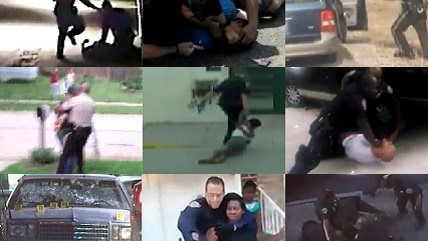Time for a Police Offenders Registry
A police job is a privilege, not a right


This week, the Department of Justice announced new guidelines against racial profiling. The changes don't actually change all that much. As regular incidents of police brutality get more and more mainstream media attention, it's time for a bold move from the White House.
There's a moral obligation to keep bad cops off the streets. A job with a police department is not a right and shouldn't be treated like one. Police unions that push for permissive rules that end up protecting bad cops pose a serious public safety threat. Nevertheless, dismantling them where they've taken root is a difficult prospect even in the long-term. There are other ways to keep bad cops off the streets. The federal government, and state governments, ought to create and encourage the use of a police offender registry list. Such a list would register individuals who while employed as law enforcement officers were found unfit for duty or faced serious disciplinary issues they may have resigned to avoid. Just as any other component of comprehensive police reform, this won't eliminate excessive police violence, but it's a start.
When actually identified, a surprising (or not) number of officers involved in controversial, high-profile use of force incidents have previously disciplinary history. Officer Daniel Pantaleo, the New York City cop who put Eric Garner in a fatal chokehold, had been previously accused, at least twice, of racially-motivated misconduct, including strip searching a man in the middle of the street and allegedly hitting his testicles. The police union in New York City is among the strongest in the country. When a rookie cop shot Akai Gurley in apparent panic last month, he didn't think twice to reportedly contact his union rep first. A man lay dying in a stairwell for no other reason that he startled a rookie, and the fact that the officer called his union representative before calling for assistance isn't shocking enough to lead to the officer's termination. Even if it were, it would still be impossible to terminate the officer immediately. While all this is happening, the state of New York is on the verge of placing even more of the disciplinary regime that applies to cops under the purview of the police unions.
But not everywhere is the situation as hopeless as in New York City. In other parts of the country, cops can get fired relatively more easily. But it doesn't stop them from finding jobs elsewhere. Richard Combs, who was the sheriff and only cop in Eutawville, South Carolina, is now facing a murder charge for shooting a resident after an argument at Town Hall, but Combs had been previously terminated from the county sheriff's office for unspecified "unsatisfactory performance." In Cleveland, Ohio, the cop who shot 12-year-old Tamir Rice, mistaking the boy's toy gun for a real one, had been previously found too emotionally unstable and unfit to carry a firearm for law enforcement. In Georgia, the cop who shot and killed 17-year-old Christopher Roupe after the teen opened the door to his home holding a Wii controller, had been previously fired for multiple disciplinary problems including shooting at an unarmed person. Then there's guys like "Florida's worst cop."
This is just a sampling of stories that received enough local attention to gain some prominence. The situation is unconscionable. Police found unfit for duty in one jurisdiction shouldn't be employed in another. Cops who resign to avoid disciplinary charges shouldn't slither their way into another department. Cops who cost taxpayers millions in lawsuit settlements shouldn't be able to expose taxpayers in other places to the same risk. Insomuch as a police department might actively be seeking out bad cops, there's not much any government can do, outside of shuttering the police department and starting over. Yet in a lot of these instances, one would hope, the hiring police departments were unaware of the candidate's previous history. In these situations, the firing police departments may be complicit, or laws protecting the "privacy" of public employees' records, or the hiring police department's own inefficiency.
State governments, and the federal government, can help. Sex offender registries, which in some jurisdictions can lead to 19-year-olds who receive sexts from their 17-year-old friends being branded sexual predators for life, are an odious thing that makes a mockery of due process and the idea of the penal system as rehabilitation. But for some of the same reasons they would work to police the privilege of employment in law enforcement. Constitutionally, the federal government could not mandate states use its police offender registry list or operate their own. Yet because many of the most troublesome police departments (those in big cities and those in the sticks) also rely most on federal assistance in one way or another, the feds could induce compliance by tying it to such assistance. The federal government has done this before, though usually to push states to impose certain laws on its residents, not to protect residents from abusive government employees. Such a list wouldn't be a comprehensive solution to excessive police violence, but it's an important part, one that could work to lower the number of bad cops operating on the streets and begin to rebuild trust between police and the communities they're supposed to serve.


Show Comments (114)